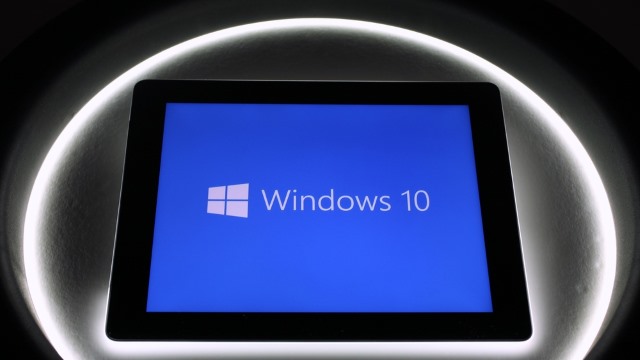
Windows 10 sees people ditching IE -- but Chrome wins out, not Edge
Launching a new web browser was always going to be a risk. Microsoft used Windows 10 as a launch pad for Edge, shedding the shackles of Internet Explorer in a bid to take on the likes of Chrome and Firefox.
Sadly for Microsoft, new figures show that Edge is failing to make inroads into Google's and Mozilla's market shares. Analysis performed by Quantcast shows that in the US just 12 percent of Windows 10 users are using Edge, while Chrome is sitting pretty with a greater than 70 percent share.

Developers can now respond to reviews in the Chrome Web Store
Reviews can be an important factor in deciding which app or extension to install. The idea of user reviews is something that has been adopted by Apple in its App Store, and is also used by Microsoft and in Google Play. The Chrome Web Store also features reviews, and a new feature has just been added that could make them more useful than ever -- the ability for developers to respond.
This is an important change as it gives developers the right of reply. When reading a review written by someone you almost certainly don't know, it can be hard to tell if their opinion should be trusted. Did they rate the app or extension poorly because there is a problem with it, or did they not understand how to do something. Giving developers the chance to reply to reviews allows for greater transparency and allows others to see that the developer in question is reading feedback -- but it may not all be good news.

Visiting this URL will crash Chrome
Browser stability is a big issue, and it's something that can very easily sway choices. A bug has been discovered in Chrome which crashes the browser if a user visits a particular URL -- 16 characters is all it takes to kill Google's web browser.
The problem is reported as affecting Chrome 45 and older, although it also seems to all kill version 47 on the Dev channel. The issue stems from the inclusion of a NULL character in the URL and has already been reported to Google.

At long last Google improves Chrome's memory and battery usage
Chrome has long been maligned as a huge drain on system resources. Open more than a few tabs and you'll notice that memory usage skyrockets, and performance can slow to a crawl. Run Chrome on a laptop that's not connected to mains power, and you've probably seen the battery meter plummet whenever you use the browser.
Now -- at long, long last -- Google is doing something about it. The latest version of Chrome boasts a number of improvements designed to reduce the browser's footprint, including a new intelligent tab restoration system that keeps the least viewed tabs suspended in the background until needed. Chrome 45 is also far more aggressive at actively cleaning up memory.

Android apps gain massive web performance boost from Chrome custom tabs
Android developers looking to include web content in their apps have a new option available to them that will help to greatly improve performance. The new (for the stable branch, at least) 'custom tabs' feature makes it possible to pre-load pages in the background resulting in load times that are a fraction of using WebView or firing up Chrome separately.
The feature can be used by developers to use their own app to change the way Chrome looks and feels, effectively blurring the move from app to the web. In addition to the speed advantages, custom tabs also bring improved security to apps, and provide users with a more familiar browsing experience.

Google unveils a new, simple, sans serif logo
Google has come a long way over the years, but one thing has remain remarkably simple: its logo. There have been various designs for the six, colorful letters and today the company has taken the wraps off the latest version... complete with an uppercase G!
It's going to take a while for some people to get used to, but the clean, sans serif look of the new logo is simultaneously modern and retro. But today's announcement is about more than the main logo -- this is the launch of a new 'identity family'. In addition to the main logo, there's also a new four-color G icon, as well as similarly-colored imagery for other elements.

How to view the source of Chrome extensions
You've found a great new Chrome extension. Installing it only takes a click, but if you're not quite sure what it's doing, whether it's safe, you might want to take a look at its source code, first.
Chrome Extension Source Viewer (CSEV) is a free extension which makes it easy to inspect the innards of other Chrome add-ons.

Chrome embraces HTML5 and tells Flash ads to eff off
The writing has been on the wall for Flash for some time now. A web technology loathed for countless reasons -- not least the security issues -- the death knell is now tolling loudly as HTML5 is more widely embraced.
Back in June, Google announced that Chrome would pause Flash ads in its browser by default, helping to eliminate a major online annoyance. Now the company has outlined when this will happen -- and there are only a few days to wait.

Windows 10 users won't see Chrome notifications in the Action Center any time soon
If you were hoping to see Chrome notifications integrated into Windows 10, prepare to be disappointed: it's not going to happen. While the Action Center might seem the natural home for Google's web browser to display messages, developers have a different opinion.
In short, Chrome's notifications are staying as they are. Despite a campaign for Action Center support, the request has been labeled Won'tFix and there's no sign that this will change for some years to come. Chrome and Windows 10 have already clashed heads once, but this time Google seems unlikely to back down.

Chrome finally becomes memory and power efficient -- you can try it out now
It's no secret that Chrome for Mac (OS X) is a mess. It eats a ridiculously high amount of memory, energy and shortens the battery life. Google announced earlier this year that it was working on a fix. And now it is delivering on that promise. The latest Chrome build -- available via Canary channel -- is significantly less resource hogging, and surprisingly faster at the same time.
The company has been hard at work improving the memory consumption in its Web browser while also making the tabs snappier. You can read about the development process and feedback at Chromium's developer website. The build dubbed 45.0.2454.46 is also significantly lighter on the battery and is no longer making the laptop crazy hot. In a recent build, the company was testing interesting internal processes like tab discarding in the background. The idea behind it is simple: make the tabs you haven't used in awhile idle automatically. This would, under the typical condition, free up a significant amount of memory.

Chrome extensions coming to Firefox as Mozilla unveils major changes
Mozilla today announces a series of important changes that affect Firefox add-ons. The good news? Add-ons should be reviewed faster, they will be more secure, and a new API means that Chrome extensions can be more easily ported across. But, of course, there is also bad news.
The bad news for developers is that Mozilla is switching to new technologies -- Electrolysis and Servo -- and this means that work will have to be done on existing extensions to ensure compatibility. In the switchover, it is likely that a large number of older add-ons will simply not be updated, but with a 12 to 18 month timescale for phasing out XPCOM and XUL means there is plenty of time for other developers to come up with alternatives to projects that have been abandoned and will no longer work.

How to force Cortana to use Google instead of Bing in Windows 10
Microsoft is pushing Bing heavily in Windows 10. Bing is the default search engine in Microsoft Edge, and while you can change this to Google (or any other choice), the process of doing so is far from intuitive -- you can’t simply pick "Google" from a list of options.
Cortana, Microsoft’s built-in personal assistant, is powered by Bing too, which means when you ask her a question she doesn’t immediately know the answer to, she’ll open up your default browser and display a list of results sourced from Microsoft’s search engine. There is a way to get her to use Google instead though, but you won’t find this in any Settings.

Windows 10 Build 10525 breaks Chrome; here's how to fix it
Chrome users who rush to install the latest build of Windows 10 have found that their favorite browser is broken. Build 10525 of Windows 10 prevents Chrome from working properly -- launch the browser and you'll be greeted by a series of notifications saying that plugins have crashed.
Additionally, when attempting to visit any website, all that is displayed is an error message that reads "Aw, Snap! Something went wrong while displaying this webpage. Closing the apps and tabs that you don't need may help by making more memory available". The compatibility issue has been reported to Google so a patch will be forthcoming soon, but in the meantime you can use this workaround.

Google Hangouts finally gets a webpage, so I switched from Chrome to Firefox
Google Hangouts is my choice for a communication service, so even though I prefer Firefox, I've been using Chrome lately since it worked better with it. Shockingly, the service did not have a dedicated web page. Yeah, Google touts the open web and web apps for its Chromebooks, but Hangouts was sort of missing from the equation.
Guess what? Today, this changes. Yeah, Google officially launches a Hangouts webpage and it is pretty damn good. It is so good, in fact, that I uninstalled the Chrome browser today and went back to Firefox full time -- I had no good reason to stay on Google's web browser.

Two decades in the making... was Microsoft Edge worth the wait?
Today marks the twentieth anniversary of the launch of Internet Explorer. First making an appearance in the Windows 95 era via the Microsoft Plus! Add-on pack which featured the excitingly-named Internet Jumpstart Kit and version 1.0 of the browser people love to hate and hate to love.
Two full decades later we have slowly but surely worked up to Internet Explorer 11 -- Chrome, for comparison has hit the 40s in less than half the time -- and now IE has been all but retired. With the launch of Windows 10, Microsoft Edge is the new kid on the block. Twenty years is a long gestation period. Was it worth the wait?
